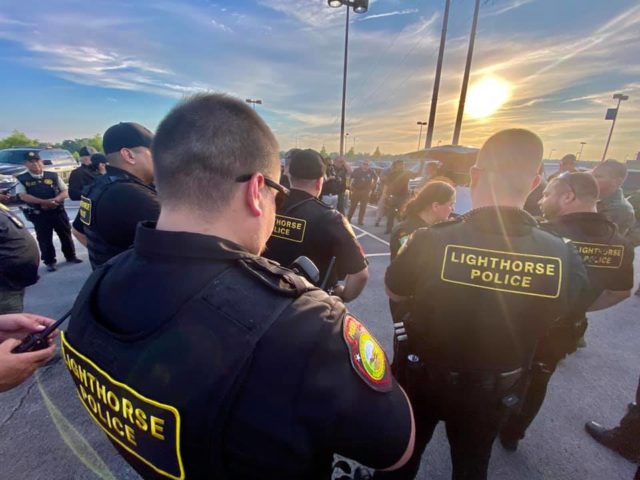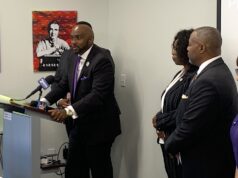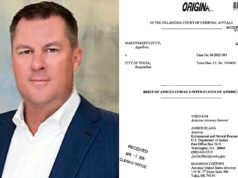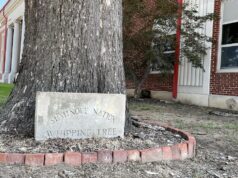

Oklahoma tribal law enforcement officials say the U.S. Supreme Court’s ruling in McGirt v. Oklahoma is strengthening momentum for improvements to public safety infrastructure in their police departments.
The McGirt decision, in July 2020, affirmed the continued existence of the Muscogee Nation’s reservation in eastern Oklahoma. The decision confirmed that, under the Major Crimes Act, only the federal government and the tribe have jurisdiction to prosecute crimes that occur on reservation land and involve tribal citizens. Courts have subsequently applied the ruling to other tribal reservations in Oklahoma.
To increase their capacity to deal with this new jurisdiction, the Choctaw and Muscogee nations have hired additional public safety officers and are entering into more cross-deputized agreements with tribal, state and federal agencies.
Choctaw Public Safety has hired 30 additional public safety officers since a court ruled that the McGirt decision applies to the Choctaw Reservation, according to Michael Hall, the tribe’s executive director of public safety. The nation now employs 80 officers to patrol its 11,000-square-mile reservation.
This story was reported by Gaylord News, a Washington reporting project of the Gaylord College of Journalism and Mass Communication at the University of Oklahoma.
The Choctaw Nation has also entered into cross-deputization agreements with 68 state, federal and local law enforcement agencies, Hall said.
There has also been an influx in calls to police since McGirt.
“I think they’ve almost doubled, because when you really stop and reality check on it and think of it prior to McGirt, it’s almost like a light switch was flipped on,” Choctaw Nation Chief of Police Jesse Petty said.
Muscogee Nation director of communications Jason Salsman said the McGirt decision necessitated building the capacity of the tribe’s police force.
“We have increased our Lighthorse tribal police department budget, doubled our officers, included more facilities in our master plan and have added a mobile command unit used in collaborative efforts with fellow agencies for work in the field where we have several on the ground,” Salsman said.
The Muscogee Nation now has more than 75 officers on patrol. Before the SCOTUS decision, the number was closer to 40.
Cross-deputization agreements with neighboring police agencies by the Muscogee Nation have gone from 39 to more than 60, Salsman said.
Cross-deputizations “are the key component” to maintaining public safety in the Muscogee Nation, Salsman said, because without them 9-1-1 dispatchers must triage whether a call should be directed to tribal law enforcement of municipal or county officers. The agreements essentially create widespread policing across the reservation no matter what agency a law enforcement officer is with.
Salsman said his tribe actively pursues and relies on cross-deputization agreements to maintain consistent policing on Muscogee Nation lands.
“They are extremely helpful in the immediate, because it allows us to keep the peace while having the time needed to build resources and greater infrastructure,” Salsman said.
Hall said cross-deputizing in the Choctaw Nation helps strengthen the knowledge and capabilities of the people policing in tribal territory under the agreements. Petty agreed.
“I’d say it’s a plus rather than a hindrance,” Petty said. “Having the ability to work together through departments within the communities Choctaw Nation is spread out through, the way I see it playing out is it’s an ability for everybody to combine resources.”
Salsman said he thinks the McGirt decision “bolsters every aspect of law enforcement on our reservation.”
“It calls on us to all pull together and work for the good of our reservation, our communities and our state,” Salsman said. “There are more opportunities to have more police, more resources and more funding when we all combine. A post-McGirt world has allowed us to do that.”
Jurisdiction existed before McGirt
Oklahoma Gov. Kevin Stitt and others have criticized the SCOTUS decision, saying it undermines law enforcement. Stitt and local prosecutors have focused on situations where criminal convictions have been invalidated and either the statute of limitations has expired for re-prosecution by a tribe and the federal government or the maximum penalty in those jurisdictions is a fraction of the original sentence.
In a statement released after the Court of Criminal Appeals affirmed the Quapaw reservation under McGirt in October, Stitt wrote, “As I have said from the beginning, McGirt not only creates a public safety nightmare, but threatens the sovereignty of our state to its core. Oklahoma is being cobbled up piece by piece. This cannot stand.”
Indian law attorney Kevin R. Kemper said the jurisdictional issues in Indian Country prosecutions existed long before the SCOTUS ruling and related decisions affirmed reservation boundaries among Oklahoma tribes and gave tribes jurisdiction to prosecute crimes committed on tribal lands.
Kemper said that around 1990-1991, there was a homicide in a small town in southern Oklahoma where he lived. He said he heard “loud commotion and sirens” from a nearby bar about a block from his house. He said he later learned a stabbing had occurred.
“A Chickasaw man was accused of knifing someone else,” Kemper said. “He fled to tribal lands so that a Bureau of Indian Affairs agent would arrest him and not the local sheriff. So we’ve had these jurisdictional issues for a long time.”
While such issues do exist in other states, it’s more focused on Oklahoma’s Indian Country, Kemper said.
“I become frustrated when I hear rhetoric implying that [the SCOTUS decision] is just freeing a bunch of violent criminals,” Kemper said. “That’s not how it is playing out in the real world. The federal government and even some tribal governments are going after people that are accused of violence most aggressively.”
The SCOTUS ruling, Kemper said, invites state, federal and tribal officials to work together as Oklahomans to respect the rights of everyone.
Salsman said the Muscogee Nation’s plans for public safety upgrades include more officers, more cross-deputation agreements, more prosecutors, investigators, judges and courtrooms and better facilities for the Lighthorse Police.
“There has never been a greater opportunity to make our people safer,” Salsman said.





















